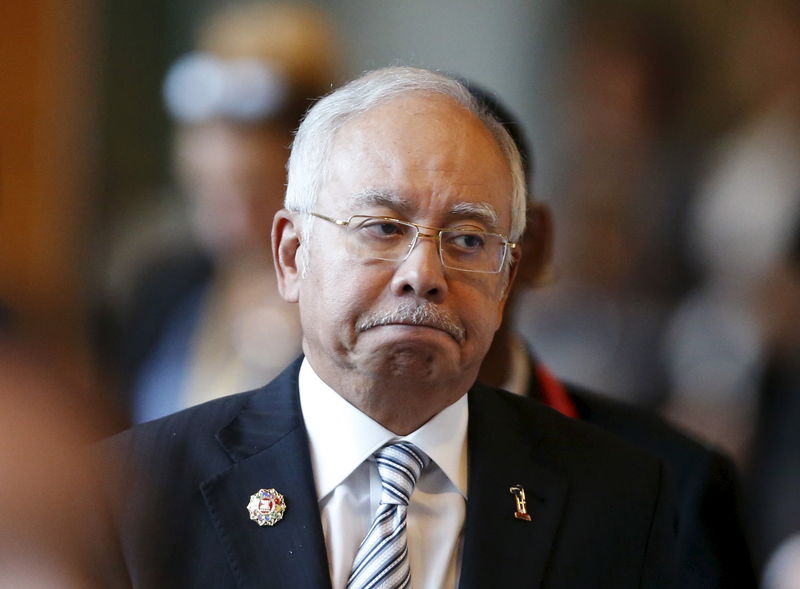By Praveen Menon and Joseph Sipalan
KUALA LUMPUR (Reuters) - Malaysian Prime Minister Najib Razak said he had done nothing wrong in receiving hundreds of millions of dollars into his personal bank accounts, as a senior party rival called on him to step aside over a festering funding scandal.
Najib has so far weathered calls for him to quit over allegations of graft at state fund 1Malaysia Development Berhad (1MDB) [TERRN.UL] and his receipt of 2.6 billion ringgit (408 million pound) in what he says was a political donation.
But pressure mounted on Najib as his United Malays National Organisation (UMNO) gathered on Tuesday for its annual meeting, after UMNO's deputy leader called on members to remove a "cancer" from the long-ruling party that looks increasingly at risk of losing the next election in 2018.
In his most detailed explanation since the scandal erupted in July, Najib said his conscience was "absolutely clear".
Malaysia's Anti-Corruption Commission (MACC) questioned Najib over the deposits at the weekend and said on Monday that it had also interviewed the unidentified donor in the Middle East.
"Firstly, the 2.6 billion ringgit is neither public funds nor 1MDB's money. This was confirmed by the MACC," Najib said in an interview with state television TV3. "It's a donation, a gift. A donation is not illegal under any legal provision."
Malaysia's Central Bank was aware of the accounts' existence, he said, adding the donor did not see it as a bribe and expected nothing in return.
The Wall Street Journal said in July that the funds had been discovered in Najib's accounts by investigators probing accusations of financial irregularities at 1MDB.
Najib, who chairs 1MDB's advisory board, has denied the money came from 1MDB, which is being investigated by several foreign agencies.
The Wall Street Journal reported in September that the FBI had launched an investigation into allegations of money-laundering at the 1MDB. The following month, an FBI spokeswoman told Reuters the U.S. government was reviewing Goldman Sachs' business relationship with 1MDB as part of a broader, wide-ranging investigation into the fund.
1MDB says it has never been contacted by the FBI.
CANCER AND PUS
The scandals have shaken investors in Southeast Asia's third-biggest economy and rocked public confidence in the coalition led by Najib's UMNO, which has held power since independence in 1957.
Backing for the government among the ethnic Malay majority that forms the bedrock of UMNO's support sank to new lows in October, according to a poll from research firm Merdeka Center.
In a speech to his supporters on Monday night, UMNO's Deputy President Muhyiddin Yassin called on the prime minister to step aside until the investigations were completed.
"I would like to suggest that the prime minister take a rest for now," he said. "Allow the investigations to proceed freely, transparently and fairly... go on leave until the case is over."
Muhyiddin was ousted as deputy prime minister earlier this year for his criticisms of Najib over the 1MDB affair.
"I would rather appeal to UMNO to undergo painful surgery than face the uncertain future in a state of coma and slow death later," Muhyiddin said.
"Let me be straight... whoever is the cancer and pus in UMNO must be discarded. In order to save the party, race and country, we must get rid of the cancer and pus."
UMNO said on Tuesday that Muhyiddin's speech would be scrutinised by a special committee to see if it violated the party's laws.
Najib, 62, still enjoys the backing of most of UMNO's powerful division chiefs, and even his fiercest internal critics, such as influential former Prime Minister Mahathir Mohamad, accept that he cannot be unseated.
Analysts say there is no obvious contender to replace Najib, and he has proved adept at playing the networks of patronage that underpin UMNO.
The opposition is also weak without charismatic leader Anwar Ibrahim, who was jailed on charges of sodomy in February, a verdict his supporters say was politically motivated.
But the uncertainty created has hit an economy already reeling from falling oil and gas prices, with the ringgit losing nearly a quarter of its value against the dollar this year.
As the party gathered for its annual meeting, Najib responded to his critics with an appeal for unity.

"I want the party to remain united," he said in the TV3 interview. "I do not want to see the party in chaos or divided...I want party members to close ranks."